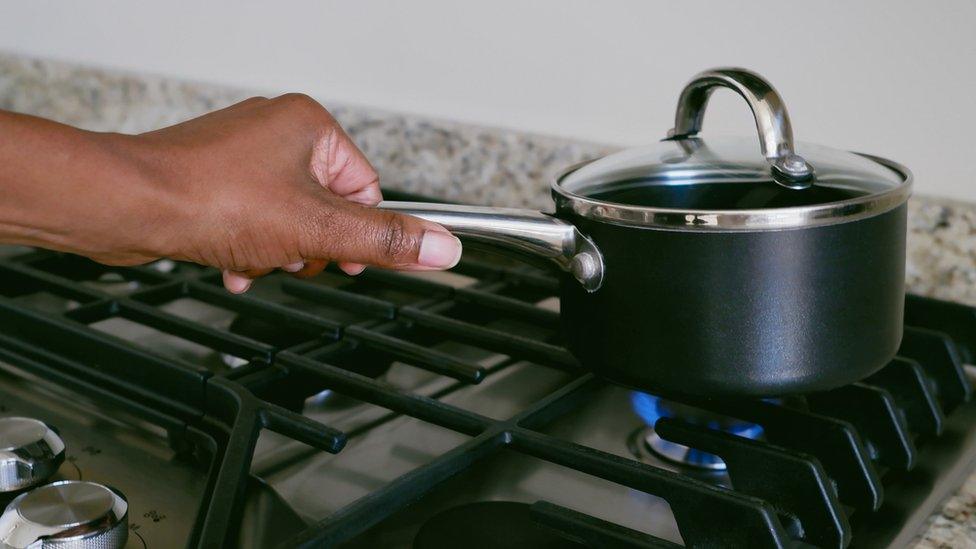When will we start seeing energy bill deals again?
- Published

Since gas and electricity prices soared in the UK last year, fixed energy deals have all but disappeared as an option for households.
But with bills due to drop from July, could they be about to make a comeback?
Under the new price cap - which is the maximum price suppliers can charge customers per unit of gas and electricity - a typical household will pay £2,074 a year for gas and electricity from July.
That is £426 a year less than what they pay now, although still far higher than what we saw before the energy crisis.
So far, most big suppliers have said they will bring their tariffs in line with the new cap but none have set out cheaper fixed deals for customers.
Such deals have effectively been off the table since the government stepped in to subsidise bills with its Energy Price Guarantee in October, holding them at £2,500 a year for the average household.
Suppliers have claimed they are not able to offer more competitive pricing plans, and so consumers have not been able to shop around.
However, Natalie Mathie, an energy expert at the switching site Uswitch.com, believes the fall in the price cap will be "a watershed moment" for suppliers, "who can now look to start offering fixed deals again given the market conditions".
"The majority of homes are on standard variable tariffs and now subject to the volatility of price cap changes every three months," she says.
"But customers should have the choice of whether to lock in the benefits of lower wholesale prices for 12 months, just as they do in the mortgage market.
"We see no reason why energy suppliers cannot offer competitive fixed deals around the £2,000 level."
When will energy switching return?
Emily Seymour, of consumer group Which?, thinks we could start seeing such deals some time this year.
"We hope to see consumers back able to make some choices," she said.
"It will be worth doing a bit of research to see if there's a deal out there that could be cost effective while also offering good customer service and low exit fees."
However, she says it will depend on where energy prices go next, with fixed deals less likely if the cap has to go up again.
Others meanwhile warn that fixed deals may not be best for everyone given the uncertainty over future prices.

For example, energy supplier Ovo launched a fixed deal for existing customers in March that was cheaper than the government's limit on household bills.
It offered a fixed 12-month tariff of £2,275 for existing customers, but anyone who signed up is now locked into that rate, meaning they will miss out when the new cap comes into effect.
How many deals will be offered?
Martin Lewis, from personal finance website Money Saving Expert, has also questioned just how much choice consumers will get when fixed deals finally return.
"I am expecting to see existing customer offers - where you will get a bespoke offer from your firm rather than deals offered across the market," he told BBC Radio 4.
This could stifle competition, he warned, as the rules say companies do not have to publish the details of their existing customer offers.
"It makes it very hard for people like me to assess," he said.
In any event, the energy analysts Cornwall Insight have suggested consumers should not expect to see huge savings from deals that do emerge.
That is because further substantial falls in energy prices will be unlikely, particularly if there is a cold winter in Europe, with the UK competing to buy gas and electricity with other countries.
"Our forecasts suggest until the end of this decade, higher and more volatile prices are going to be seen, and that includes the impact they're going to have on domestic bills unfortunately," Cornwall analyst Kate Mulvany told the BBC.
What should current customers do?
Energy suppliers should be in touch in the coming weeks to let customers know what their bill will look like under the new cap.
However, Ms Seymour says it is always worth having a conversation with your supplier about any bespoke deals they can offer you.
If you find yourself struggling to pay bills, consumer experts suggest speaking to your energy supplier about a payment plan that is manageable.
By paying what you can - even if it's less than the amount due - your arrears will grow more slowly and your supplier is likely to be less worried about your debt.
Your supplier could also check if you qualify for any government schemes.
It's also important to check the amount you pay each month if you use a direct debit.
Your monthly payment is based on your estimated usage through the year not what you actually use so keep a close eye and update your supplier with your meter readings.
Listen to The Martin Lewis Podcast for more on the new energy price cap

Here are some energy saving ideas from environmental scientist Angela Terry, who set up One Home, a social enterprise that shares green, money-saving tips.
Getting a water efficient shower head free of charge from your water company and using showers rather than baths
Considering loft insulation, which she says costs around £460 for a typical semi-detached home and could save £355 a year on gas bills
Hanging out washing instead of using a tumble dryer, and walk instead of drive when possible
Use windy days to feel where draughts are in the house. Wetting the back of your hand helps to locate them, then use insulation or draught-proofing tape
When available, press the smaller button to use less water to flush the toilet

- Published25 May 2023

